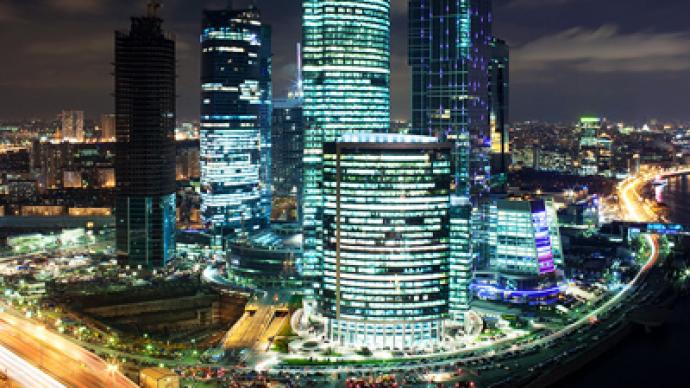What made Russian business in 2011

From major mergers and accusations to joining the WTO, from fuel shortages to Nord Stream, from government decrees to market fluctuations – all of that made up the turbulent business year of 2011.
JanuaryInsurance rates for employers in Russia increased from 26% to 34%. The measure has been implemented to increase pension payments within Russia by up to 30%, but it failed. The step slowed wage increase and forced more employers to pay a part of salaries off the books, according to analysts.Vimpelcom Ltd approved the terms of a deal to purchase Wind Telecom (formerly Weather Investments) from Egyptian billionaire Naguib Sawiris for $6.5 billion, with the Norwegian shareholder Telenor opposing the deal. Mr Sawiris in turn would get a 20% stake in Vimpelcom and 30.6% of voting shares.
FebruaryThe Central Bank of Russia announced a 25 basis point hike in the refinancing rate coupled with tightened reserve requirements due to the rising inflation. The CBR decided to increase the cost of lending for other Russian banks and interest rates on some of its operations by a quarter of a percent from February 28, with reserve requirements also going up 1% to 4.5% for liabilities of credit institutions.
MarchFrench energy producer, Total has bought a 12% stake in Russian gas producer Novatek for $4 billion, with the two parties intending to increase this to 15% by the end of 2011 and to 19.4% within 3 years. Total CEO, Christophe de Margerie, and Novatek Chairman Leonid Mikhelson signed two Memorandums of Cooperation, in the presence of Russian Prime Minister Vladimir Putin. The deal makes Total the major international partner on the Yamal LNG project with a 20% stake and Novatek retaining a 51% stake.Russia’s largest retail bank, Sberbank announced a deal to buy 100% of the investment bank Troika Dialog for about $1 billion to create the largest player in Russia’s banking and investment services market. The move is expected to significantly increase the client base and to broaden the supply of services.Troika Dialog will operate as a stand-alone entity within the Sberbank group of companies for the next three years, with Ruben Vardanian remaining its CEO and Sberbank representatives joining the Troika Dialog Board of Directors.
AprilSibirtelecom, Southern Telecommunications, Northwest Telecom, Volgatelecom, Uralsvyazinform, CenterTelecom, Dalsvyaz and Dagsvyazinform are officially merged into Rostelecom. The consolidation process has seen ordinary and preferred shares in the eight companies converted into ordinary Rostelecom shares along with bonds. As result the biggest telecommunications company in Russia was created. Fuel crisis broke in Russia as several regions were hit by shortages of fuel. Thousands of drivers in the Russian Far East and Habarovsk region, Central part of Russia, Volga region and in St.Petersburg lined up in the front of petrol stations. The main reasons for the fuel crisis was a government ban on selling Euro-2 petrol, petrol producers’ failure to upgrade its production to meet government requirements as well as attempts to set up state control on patrol prices, experts say.
MayThe first three sections of the 1224 kilometre, 55 billion cubic meters per year, Nord Stream gas pipeline have been laid along the bed of the Baltic Sea. They have been joined over the summer with the pipeline, the first of two which will make up the completed Nord Stream project. The second pipeline is expected to become operational in 2012.N.V. Yandex, the biggest Russian internet search-engine, raised $1.3 billion at its IPO, with company valued at $8 billion. The Russian search engine placed a 16.2% stake, or 52.17 million shares, well above the $20-$22 price range originally mooted, valuing the stock twice that of Google relative to earnings at roughly 23 times.
JuneTwo main Russian mineral fertilizers producers Uralkali and Sylvinite concluded a merger agreement. They created new giant company – the world's second largest potash fertilizer producer (after Canadian Potash). Uralkali bought 20% of Silvinit ordinary shares for $1.4 billion and then attached it to itself through a conversion of the shares. Silvinite's shareholders received 133.4 ordinary shares in Uralkali per ordinary share of the company and 51.8 ordinary shares per preference share. The merger gives an opportunity to optimize production and transportation, degrade financial and administrative spending.Russian electricity export monopoly Inter RAO stopped electric supply of Belarus after it failed to pay its debt of about 600 million roubles on time. Belarus pledged to pay the debt, but couldn’t find enough Russian currency because of its financal crisis.
JulyThe Russian Government ended the grain export embargo, put in place after the 2010 drought. The embargo proved to be inefficient and boosted prices inside Russia as well as outside the country. After 17 million tones of wheat have been exported, world food prices fell 1% compared to November 2010, said a report prepared by the Food and Agriculture Organisation of the United Nations (FAO). Customs Union between Belarus, Kazakhstan, and Russia removed all custom borders between the states. Russia, Kazakhstan and Belarus have launched a customs union as a first step towards forming a broader EU-type economic alliance of former Soviet states. Leaders of Tajikistan and Kyrgyzstan have also voiced their interest in potentially joining the union.
AugustThe Russian Government announced its plan to broaden the privatization of major banks and companies by 2012. Some state shares, including VTB, Rosneft, RusHydro, Inter RAO and AlRosa, would be sold with a reserved golden share for the state. The cost of state shares is estimated to be about 6 trillion roubles.Russian markets fell with global markets endured the worst sell-off since the middle of October 2008 as the Dow Jones close 4.3% lower overnight with the FTSE 100 in London down 3.4%. In Moscow, the MICEX was 3% lower at 11.00 AM after opening 4% down. August,5 trade saw Asian markets continue to slide with Australia down more than 4%, Hong Kong down 4.7% and Tokyo down 3.6% with concerns over the global economy ranging from Eurozone sovereign debt fears, to weak U.S. growth figures, to inflation in China dogging investors.After that global markets have seen a nervous week spurred by a U.S. downgrade and persistent debt worries in the Euro zone, have been considered by many analysts as a beginning of the second wave of crisis.After long negotiations with BP, Rosneft concluded a strategic alliance with Exxon Mobil. The British based oil company had previously concluded an agreement with Rosneft to developing the potentially big reserves from the Arctic shelf in a stock exchange. The AAR consortium. which has a stake in the BP joint venture TNK-BP, thought it went against the agreement it had with BP over doing business in Russia and Ukraine. Rosneft will hold 2/3 and ExxonMobil 1/3 of JV in Arctic shelf and black sea exploration. Initial investment is expected to be 3.2 bln dollars.
SeptemberSberbank completed its deal to buy Volksbank International AG, spending between €585 – €645 million, depending on VBI's 2011 business performance. Sberbank CEO and Chairman, Herman Gref, said the move would see Sberbank become a considerably more significant player in Central and Eastern Europe.Russian Gazprom in cooperation with Eni of Italy, EDF of France, and BASF/Wintershall of Germany signed the South Stream project agreement. The project is aimed at diversifying natural gas transport routes to consumers in Europe and involves building a pipeline across the Black Sea to countries in Southern and Central Europe. The maritime section is expected to have a capacity of up to 63 billion cubic meters per year. As reported, EDF and BASF will each get 15% in the project, while Eni's stake drops to 20%. Gazprom will retain 50%. Long standing Russian Finance Minister, Alexei Kudrin, resigns after a public confrontation with President Dmitry Medvedev. Medvedev had earlier told Kudrin that his weekend comments, to the effect that he would not be able to serve Medvedev as Prime Minister, were unacceptable and he had until the end of the day to decide whether to resign.
OctoberRussia, Ukraine, Belarus, Kazakhstan, Armenia, Kyrgyzstan, Moldova, and Tajikistan have signed an agreement committing to creating a free trade zone which is designed to reduce all trade fees on a number of goods between the countries – and some expect the rules to come into force in 2012. Azerbaijan, Uzbekistan and Turkmenistan were the only members of the 11-strong CIS union to stay out of the new trade zone, but still have the opportunity to join it before the year's end, if they decide to do so. Georgia approved Russia’s joining the WTO after long negotiations with meditation of Switzerland. Georgia originally threatened to veto Russian accession unless its customs officers weren't allowed to monitor all goods traveling between Russia and the breakaway provinces of South Ossetia and Abkhazia. Moscow and Tbilisi finally an independent company would carry out the control and would also assist Russian and Georgian officers with customs administration.
NovemberThe Nord Stream pipeline was finally launched after 13 years of planning and two years of construction. It delivers Russian gas to an estimated 26 million homes in the EU. The Nord Stream is the longest sub-sea pipeline in the world – over 1,200 kilometers – and it is operated under the highest pressure as well. The pipeline is planned to increase regional security and increase gas supply, because Europe energy demand will increase, especially in Germany that plans to closes down all of the nuclear stations over the next 10 years.Gazprom agreed to buy out the Belarus gas transit system Beltransgaz and became its owner. Russia’s gas major bought a 50% share of Beltransgaz in 2007. Belarus has offered a controlling stake in its gas transit system and an oil refinery, which could further secure Russia's gas supply routes to the European market.
DecemberPresident of Russian Binbank Miikhail Shishkanov and Sberbank Investment announced a deal to buy Russian developer Inteco, with experts estimating the assets sold at around $1.2 billion. Inteco was one of the market leaders in Moscow construction, and is expanding into the regions and into foreign markets. The firm had been run by the wife of Moscow's previous mayor Luzhkov, and the closeness brought accusations of corruption.Russia joins the World Trade Organisation after 18 years of negotiations. The WTO has officially welcomes Russia as its newest member at a ceremony in Geneva. Ratification scheduled for next summer will put the final dot in the long running story. Ministry for Economic Development, says consumer prices are expected to fall by 10%, with the accession adding another 4.3% to GDP growth. The World Bank also calculates that spending will go up 7%.The MICEX merged with Russian Trading System (RTS), creating a single entity. It is now called MICEX-RTS. The full merger of the two organizations is not yet completed while they carry out a rebranding, that is expected to be completed in the first half of 2012.














